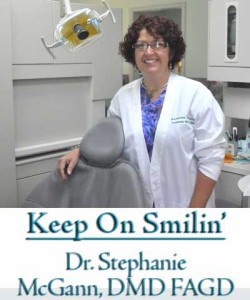Health impact of lost teeth can include mental, physical decline in old age
By Dr. Stephanie McGann, DMD FAGD, Columnist, The Times
 Tooth loss is more than just uncomfortable. While reading a journal article I discovered a study from London that was published in an American geriatrics journal. Apparently in a study of adults over age 60 those who had lost all of their teeth had a more significant decline in memory function and walking speed than those who had some natural teeth remaining. This increased decline in function was most pronounced for adults between the ages of 60 and 74. According to this study excessive tooth loss should be considered a risk factor for the onset of metal and physical decline as we age.
Tooth loss is more than just uncomfortable. While reading a journal article I discovered a study from London that was published in an American geriatrics journal. Apparently in a study of adults over age 60 those who had lost all of their teeth had a more significant decline in memory function and walking speed than those who had some natural teeth remaining. This increased decline in function was most pronounced for adults between the ages of 60 and 74. According to this study excessive tooth loss should be considered a risk factor for the onset of metal and physical decline as we age.
This is certainly some food for thought. One problem with the study as that increased tooth loss with age can be often correlated with socio-economic status or other medical conditions. So other factors may also be contributing to these results. This report tells me that dental health and physical health cannot be separated. We have known for some time that increased dental disease can cause increase risks for cardiac and other systemic problems.
The top ten list for why people lose their teeth.
- Poor oral hygiene – Many teeth are lost due to periodontal or gum conditions. Where an otherwise healthy tooth becomes so loose that it is uncomfortable to use. The chronic infection from gum disease can compromise many other areas of the body.
- “Waiting till it hurts” – It’s always sad when a small area of decay that could have been easily restored with a small filling is ignored. The decay get’s bigger and eventually gets close enough to the center of the tooth that it is painful. While many of these teeth can be saved with root canal therapy – many cannot. Some advanced decay is just not fixable. This happens usually because of two reasons, fear or affordability.
- Tooth fracture – Sometimes teeth break. Usually these teeth have had a large metal filling or other dental treatment. Your dentist may recommend a crown (cap) on teeth that may have weakened over time. While some fractured teeth can be repaired with a crown, unfortunately some breaks are just not repairable.
- Incomplete treatment – when a tooth has root canal therapy (endodontics) after the procedure is complete it is usually recommended to place a crown on the tooth. Why? A tooth that has had the nerve and soft tissues removed is functionally dead and may become brittle with time. Teeth with root canal treatment can decay or break without any pain or warning. Many times these teeth are lost.
- Poor nutrition – Even in today’s modern world, some people just don’t get adequate nutrition. Individuals who have a calcium poor, sugar rich diet often suffer from rampant decay. This type of tooth decay can occur on every tooth in the mouth, often at the same time. The teeth breakdown rapidly and the problem becomes extensive.
- Side effects of medications – Many of the medications that we take to prolong our lives, keep our blood pressure at an acceptable level and maintain daily function have the side effect of drying up saliva. Saliva (spit) is essential to good oral hygiene and good nutrition. Saliva lubricates the inside of the mouth allowing food to be chewed and swallowed. It acts as a buffering agent to prevent the acids that cause tooth decay from overwhelming the teeth and gums. It also provides enzymes that are essential for digestion. Without saliva teeth decay quickly. Your dentist can provide assistance with special toothpastes, and extra fluoride to counteract some of the damage that can occur. Sometimes this gets too far too fast, particularly in chemo patients or individuals who spend a long period of hospitalization.
- Trauma – yes some teeth are lost due to a traumatic accident or injury. It’s not just ice hockey, we see teeth knocked out or broken during everything from a car accident, playground mishap to assault. Not only are teeth lost but many times the facial or jaw bones that support these teeth are broken and damaged.
- Stress – Most stress related damage can be mitigated by the use of an oral appliance or dental orthotic. Sometimes it’s just not enough. Teeth can wear down to the gum lines, broken off and at times beyond all hope of repair. If you have a night guard, wear it. If you have chewed through it, get a new one. If your appliance no longer fits or is uncomfortable ask your dentist to fit you for a different type. Today there are many options for dental appliances.
- Excessive acid – Teeth can be significantly damaged by the repeated attacks of stomach acid caused by repeated vomiting. We think of bulimia (forced vomiting from an eating disorder) or the ravages of chemotherapy. Gastric reflux is another potentially damaging factor. Dentists often can identify this specific acid attack by the appearance of the teeth. If it goes untreated teeth can be seriously compromised.
- Personal preference – generations ago it was considered a great wedding gift for a bride-to-be to be treated to full mouth extractions and a set of shiny new dentures. We have come a long way from this, yet there is a still a preference in some groups of people, for false teeth over having to take care of their own.
All of the research shows a direct correlation between oral health and dental health. Taking care of your teeth so the majority of them last your lifetime is good sound preventive medicine. Thanks to the affordable care act there are dental plans that individuals can actually afford. While there are some insurance carriers who are writing policies that make no sense the door has been opened for everyone to be able to care for their teeth.
If you haven’t seen your dental provider in the last six months, make an appointment today to do so. You’ll be glad you did.
Dr. Stephanie McGann, who has more than two decades of dental practice experience, is a resident of the Unionville area and along with her partner, Dr. Marie Scott, operates The Brandywine Smile Center, a family-friendly dental practice in Concordville. Dr. McGann has opened a new practice in Valley Township, Rainbow Valley Dental. She is a Fellow of the Academy of General Dentistry.






